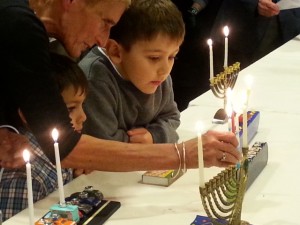Certain events in history are watershed occurrences. Some have moved us forward, some weigh heavily on the souls and fibre of civilisation. The horrific Paris terrorist attack by ISIS, or ISIL, is one such tipping point.
Suddenly there are declarations of World War III, a security crisis and the massive human problem of dealing with hundreds of thousands of Syrian refugees. Our eyes have been opened to the necessity of waging war against radical extreme Islam.
ISIS now controls a territory larger than Britain, has recruited at least 60,000 militants and thrives in the heart of Iraq and Syria. It is bent on re-establishing the Sunni caliphate and destroying the “heathen” West. And now it threatens our nations, cities and way of life.
Well, it is Chanukah. The holiday begins on the evening of Sunday 6 December, when we light the Chanukiah, sing, eat latkes and doughnuts and retell the story of the Maccabees’ brave stand for freedom against the Greek Seleucid monarch, Antiochus IV Epiphanes, who reigned from 175 to 164 BCE.
The pre-eminent lesson of Chanukah is that in order to retain our values and live as Jews, freely practising our religion, we have to fight for the right simply to exist.
The war of the Maccabees was an existential fight, not so much for numbers, though scores of thousands died, but for the preservation of our Jewish soul, our right to live as Jews.
After being prevented in 168BCE by the superpower, Rome, from pursuing his dream of conquering Egypt, Antiochus returned to his Syrian realm to find that his Jewish subjects had reacted to a false report of his death in Egypt by ousting his choice of High Priest and reinstating the previous holder.
He vented his fury and frustration on Jerusalem’s Jews. Some 40,000 men were executed, around the same number of women and children sold into slavery, and their homes demolished.
He then turned on Judaism itself, banning Torah study and circumcision as well as converting the Temple to the worship of Zeus, with a daily sacrifice of a pig – he had already stolen the Temple’s golden treasures.
We learn from this heroic episode of Jewish resistance that evil exists, that our people have had to fight against those bent on destroying us.
Earlier this year, archaeologists discovered under a parking lot in Jerusalem the remains of the “acra” fortress built by Antiochus between Ir David, the City of David, and Har Habayit, the Temple Mount, on the site of demolished Jewish homes. It is all there, an archaeological miracle: the barracks, the watch towers, the spying on all Jewish activity – symbols of despotism and brutality.
In Israel Chanukah will be celebrated in grand style as Jewish history seen from the Israeli view, reminding us of Israel’s past and ongoing fight against forces bent on its destruction not just as a sovereign state but increasingly for the right of Jews to be Jewish.
Alarming claims from Mahmoud Abbas and the Palestinian Authority that the Kotel, the Western Wall, the last remnant of the Second Temple, is an “Islamic shrine”, is the clearest denial of Jewish ties to Jerusalem, both historically and religiously.
The western world has been increasingly shocked by ISIS brutality. Its origins lie in the Muslim Brotherhood, founded in Egypt in 1928. Sadat’s assassination in 1981 was carried out by a member of a Brotherhood offshoot. The 1979 Iranian theocratic revolution supported Hamas, another Brotherhood offshoot, in Gaza, as well as the Hezbollah militia in Lebanon. All these factors have crippled the last remnants of “secularism”. Yes, even the brutal dictatorships of Nasser, Assad, Saddam Hussein and others are looking less threatening than ISIS madness.
The Jewish people, with our experience of fighting terror and evil around Israel, can play a crucial role in giving others strength and hope against pure evil.
- We light candles to keep faith in our ideals, while never losing sight of the practical and brutal realities needed to stay alive as Jews.
- We light candles in the hope that the Almighty will give us the strength to protect the persecuted and pray that we never give up our hope in a better tomorrow.
- We light candles to remain strong in our Jewish convictions and determined to maintain our way of life.
- We light candles so that we can continue to be a “light unto the nations” and teach our compatriots in this country, in France and throughout the free world that we can and will win this battle. We will never surrender to evil.
God bless our people, Israel, our families, our loved ones, and the vast majority of Christians, Jews and Muslims who desire not war, not terror, but peace.
Chag Chanukah Sameach
Rabbi Stuart Altshuler


